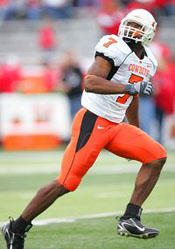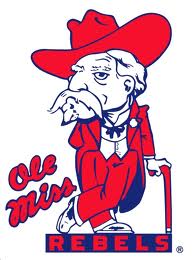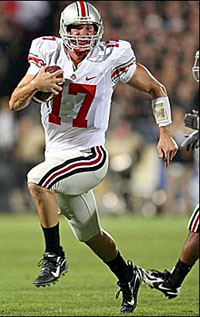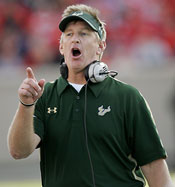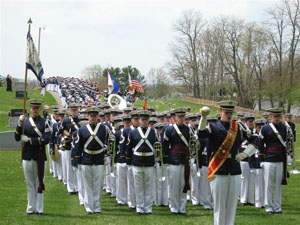|
CONTENTS
WFL Rules Changes
Another Craig Krenzel?
Humble Beginnings
Bear Helped the Golf Coach
Packers' Waiting List
LSU's Favorite Opponent
Tim Tebow, Missionary
The Highty-Tighties
Deaf Cornerback
Origin of Ole Miss
Football:
Did You Know? II
Football: Did You
Know? III
Football: Did You
Know? IV
Football: Did You
Know? V
Football: Did You
Know? VI
Football: Did You
Know? VII
Football Magazine
Golden Rankings Home
Top of page |
WFL Rules Changes
When Gary Davidson announced that his creation, the World Football League (WFL), would begin play in July 1974, he also listed ten rules changes the league would implement in an attempt to make games more exciting.
- Teams would kickoff from the 30y line, not the 40, to encourage more returns.
- Touchdowns were worth seven points.
- Instead of kicking the extra point, teams would go for an "action point" by running or passing.
- Missed FGs from outside the 20 would be returned to the line of scrimmage to discourage field goal tries.
- No fair catches were allowed on punts.
- Receivers needed only one foot inbounds to complete a catch.
- One offensive back would be permitted to go in motion toward the line of scrimmage before the ball was snapped.
- The penalty for holding was 10y, not 15.
- If a game ended in a tie, teams would play a fifth period broken into two 7.5-minute segments. The team scoring the most points at the end of the extra 15 minutes would be the winner.
Did the changes increase scoring?
- The best answer is, "Somewhat."
- In its only complete season of competition, 1974, the WFL averaged 21.3 ppg, which was 3.1 points more than the NFL averaged that year.
- The WFL teams also averaged almost 14y more per game than their NFL counterparts in 1974.
- Since the rushing averages were essentially the same in the two leagues, the increase in yardage came from passing.
- The WFL didn't make it through its second season and folded October 22, 1975.
Many of the WFL rules innovations were eventually adopted by the NFL.
- 1974 - Kickoffs were moved from the 40 to the 35.
- 1974 - The penalty for offensive holding was reduced from 15 to 10y.
- 1974 - Sudden-death overtime was instituted for regular season games.
- 1994 - Kickoffs were moved to the 30.
- 1994 - Missed FGs from outside the 20 were returned to the line of scrimmage. Eventually, the rule would be amended to place the ball at the point of the kick.
- 1994 - The NFL finally adopted the two-point conversion, which had been in use in college football since 1958 and in the AFL during its entire existence (1960-69). The WFL didn't use the two-point conversion because it substituted the "action point" after each 7-point TD.
- 2011 - Kickoffs were moved forward to the 35 from the 30.
Reference: "A Bright New Look or the Same Old Game?"
Mark Speck, The Coffin Corner, Vol. 37, No. 5 |
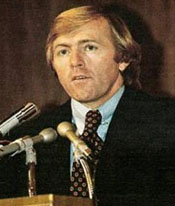 Gary Davidson
Gary Davidson

Three ex-Dolphins, Paul Warfield (42),
Larry Csonka (38) and Jim Kiick (21) with the Memphis Southmen of the WFL
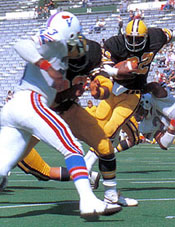
WFL Action between Charlotte Hornets and Birmingham Americans
|
|
Ohio
State's 6'5" 243 lb. QB, Todd
Boeckman, is a 23-year-old fifth-year junior.
- He is starting
this season [2007] for the first time since his senior year in high school.
- He postponed
enrollment as a full-time OSU student for one season so he
would have two years of eligibility following Troy Smith's
graduation.
- Then he redshirted his first season in Columbus.
- In his two seasons
of eligibility prior to 2007, he threw just seven passes.
- He is widely compared
to the Buckeyes' 2002 national championship QB, Craig
Krenzel – nothing spectacular but steady with few mistakes.
|
|
When Jim Leavitt was hired to start a football program at the University of South Florida in 1998, he faced a daunting challenge.
- He held his first team meeting underneath a shade tree because there
were no facilities on campus.
- After four years in Division I-AA, the Bulls moved to Division I-A as an independent in 2001.
- Two years later, they joined
C-USA and went to the Meineke Car Care Bowl following the 2004 season.
- Then
in 2005, USF moved to the Big
East.
- The 2007 defensive leader is LB Ben Moffitt. He
got married in high school and now has two children. He drives about 100 miles
round trip every day to school. Yet he has never missed or been late to a
team meeting or a study hall.
|
|
|
Bear Helped the Golf Coach
Golfer
Gay Brewer, who won the Masters in 1967, died on August 31,
2007. He attended the University of Kentucky
but not on a golf scholarship because the university did not offer them. Instead,
the football coach arranged a football scholarship for him. Brewer
tried out as a holder on place kicks. The football coach who helped the golf
program? Bear Bryant
|
|
As of 2007, the Green Bay Packers have a season-ticket
waiting list of 74,500. One man, land developer Doug
Burris, owns 331 season tickets, which he acquired by buying various
properties. He sells the vast majority of the tickets game by game to people
from many states. He turned down an offer of $1 million for his entire ticket
package from the owner of a sports bar in Green Bay.
|
LSU
has played Mississippi
State more times than any other opponent (102 times
through 2007, with LSU
holding a 65-33-3 advantage).
- Since the 1970s the series has alternated between
Baton Rouge and Jackson or Starkville.
- However, from 1934 to 1957
(except 1943 when State did not field a team because
of World War II), the teams played every year in
Baton Rouge – 23 straight games at Tiger Stadium.
- Surprisingly, MSU won 11 of those games, with
one tie.
- The teams also played in Baton Rouge every year from 1964 through
1970. The home team won all those games.
|
- Tim
Tebow, the Florida
"Folk Hero" QB, was born in the Philippines while his father
was a missionary there.
- Tim returns there nearly every year to preach (the son as well as the father).
- Like his four siblings, Tim was homeschooled by his mother. However, a 1996 Florida law allows homeschooled
students to participate in sports at a nearby school. He and his mother moved
into an apartment down the street from Nease Senior High so that he could
QB the passing offense there.
- Since both his parents are UF
grads, Gainesville was his obvious choice.
- He has more requests for
speeches than he can fill. However, he does enjoy speaking at prisons. At
one, more than 195 prisoners "came forward" to accept Jesus after
his talk.
- Tim is reminiscent of another Gator
QB, Danny Wuerffel, who
was also a minister's son and has established his own ministries in New Orleans
(where he played for the Saints)
and elsewhere. Tim may also follow in Danny's
footsteps by winning the Heisman. [He did.]
|
Virginia Tech has a number of traditions associated with its football program.
- The Regimental
Band of the Corps of Cadets is called the "Highty-Tighties." They appear and play at games along with the regular marching band.
- School
tradition dictates that one player carry an American flag onto the field and
another tote a Virginia state flag.
- Starting in 2007, after the campus massacre
in the spring, a third player carries a flag designed to serve as a symbol
of the tragedy. It features an orange ribbon with VT overlay.
- The players' jerseys also bear this emblem on a patch.
|
|
|
|
|
- Oklahoma
State junior [2007-8] cornerback Martel Van Zant is
deaf. His mother contracted chickenpox when she was pregnant, resulting in
his loss of hearing.
- OSU recruited Martel when other big-time schools did not because then-Cowboys coach Les Miles wasn't scared off. Miles has a deaf brother and knows American Sign Language.
- Van Zant,
of course, says he's not affected by big crowds but can feel the vibrations
when it gets really loud.
|
|
"Ole
Miss" was selected as the name for the University
of Mississippi during a contest to name the yearbook in 1896.
However, the nickname for the athletic teams is not as old. The controversial
"Rebels" label was suggested
in 1936 by Judge Ben Guider of Vicksburg and selected by
a panel of sportswriters.
Previously, the teams' nickname was "The Flood."
(That made for soggy matchups when Ole Miss played the Tulane Green
Wave or the Alabama Crimson Tide.)
|
|
|
